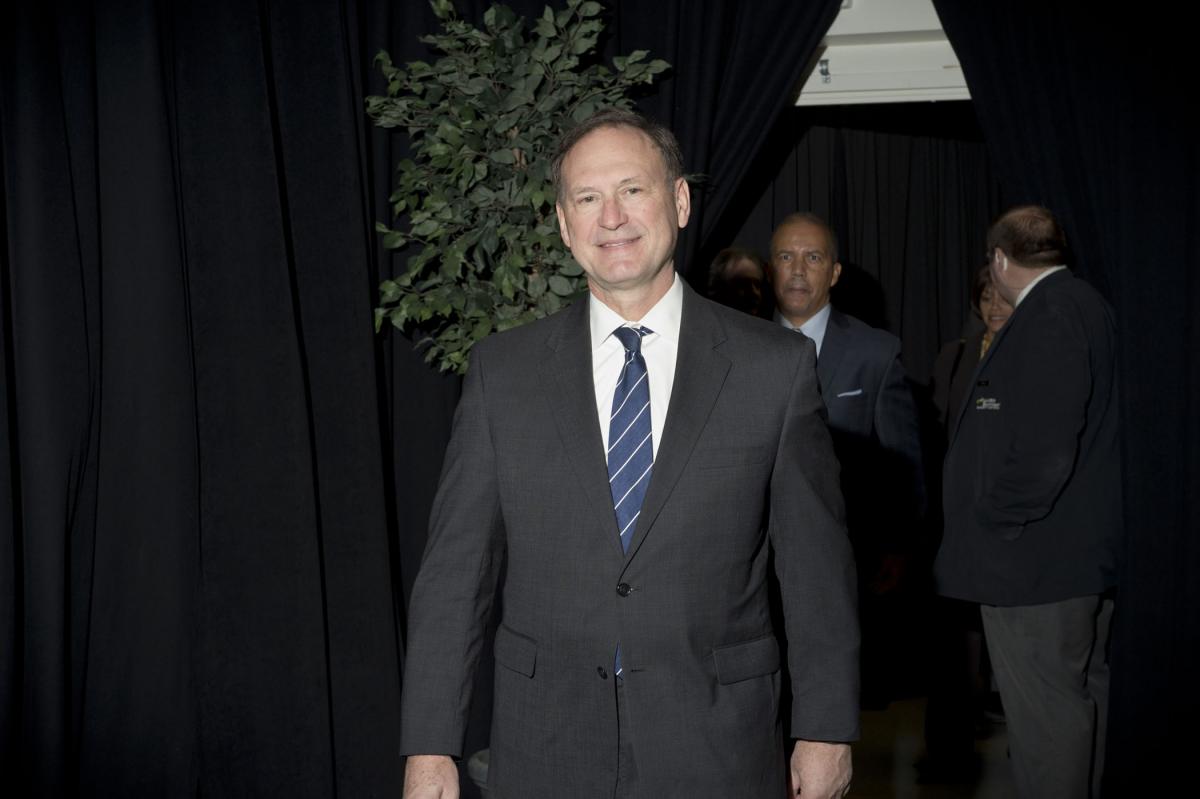Samuel A. Alito, Associate Justice of The U.S. Supreme Court, Offers Five Principles of Citizenship

U.S. Supreme Court Associate Justice Samuel A. Alito, Jr. discussed the importance of citizenship at the College’s 2015 Judge Edward R. Becker Citizenship Award luncheon.
“Good citizenship is not easy,” he told an audience of students, judges, lawyers, business and civic leaders. “It requires hard work.”
Alito, who was the seventh recipient of the Becker Award, spoke on January 15, the actual birthdate of the late civil rights leader Martin Luther King, Jr. The citizenship award, sponsored by the College’s Fox Rothschild Center for Law and Society, honors the late Edward R. Becker (1933-2006), a Philadelphia native, scholar and a highly respected jurist who served with Alito on the Third Circuit U.S. Court of Appeals. Judge Becker was a civil servant noted for his down-to-earth humility, his ability to connect easily with diverse groups and for upholding the highest standard of the law.
With Judge Becker’s widow, Flora, and his children Susan and Charles seated in the audience in the Great Hall, Alito used Becker’s life to offer guidelines on good citizenship. The Justice laid out five principles that Judge Becker adhered to in living a life as a legal scholar, a family man and a public servant.
PRINCIPLE ONE: HAVE A CONNECTION TO THE PLACE WHER E YOU LIVE
Judge Becker was a Philadelphian who worked hard for the city and its people. Americans today, however, are very mobile and do not live in one place for a very long time, Alito noted. He said this freedom, plus the ease to communicate with anyone in the world via social media is a good thing, but, for many people, the freedom of movement “has become much more important than physical proximity and that can have its downside.”
Alito said, “A number of commentators have made the point in recent years that our country is becoming more stratified (and) that we are losing a common culture that the country is dividing up based on all sorts of things. That, of course, is contrary to what we aspire to as a nation and it is certainly contrary to what Ed Becker stood for.”
PRINCIPLE TWO: REACH OUT TO A DIVERSE GROUP OF PEOPLE
Becker was a one of the finest federal judges in history, Alito said. Yet he made it a point to interact with “real” people by taking public transportation to get to and from work, and using the public entrance of the federal courthouse in Philadelphia, even though there was a private entrance for judges.
Becker was concerned that federal judges were vulnerable to "black robe disease," which “is the thing that happens when you put on the robe of a judge” and receive the constant respect shown to them in court and in public, Alito said to laughter.
PRINCIPLE THREE: REAL CONCERN FOR REAL PEOPLE ENCOUNTERED IN DAILY LIFE
Alito said Becker learned from his father at an early age to “treat people with dignity and consideration.” Becker followed that advice daily. In fact, he read the Philadelphia Daily News, billed as the “people’s paper,” daily to stay abreast of the everyman’s issues and challenges.
"It is sometimes a lot easier to love people in general than it is to love people in particular," Alito noted. "Ed was not like that. He loved both. He had a great concern for people in the abstract but also for the particular people he came in contact with.”
PRINCIPLE FOUR: IMPROVING SPIRIT
Alito remembered Becker as “a man who made a big difference in my life.” He compared Becker’s life of service to others to that of Philadelphian Benjamin Franklin, an inventor, a writer and a signer of the Declaration of Independence who helped to establish the nation’s first lending library.
“As we know, Franklin had a wonderful, pragmatic, problem-solving spirit,” Alito said. “As a young man, Franklin believed that he could rise in the world even though he lacked formal education, family connections, social standing and wealth…If he had of lived a little longer, he might have founded the Community College of Philadelphia.”
PRINCIPLE FIVE: HARD WORK, PUBLIC SERVICE AND STRIVING FOR EXCELLENCE
Alito encouraged the College’s students in attendance to get involved in public service and work hard like Judge Becker. He recalled Becker as "a legendary worker" who read legal briefs during halftime of watching Philadelphia Eagles games and during intermissions at concerts.
"He once gave me this advice about getting a haircut," Alito said. "He said I was wasting time by not working while I was getting a haircut. He said I should tell the barber that when he was trimming the hair on the right side of my head, I could be holding a brief in my left hand and reading it and then we could reverse. I didn’t see that but I fully believe he did it.”
The audience for the Becker Award included people from all walks and stages of life, including Philadelphia Mayor Michael Nutter.
Many students clearly understood they had had a front seat to history.
“A lot of people take community college for granted,” Indiana Crousett told a reporter for the Philadelphia Metro. “It’s a pleasure and an honor to have a Supreme Court justice here.”